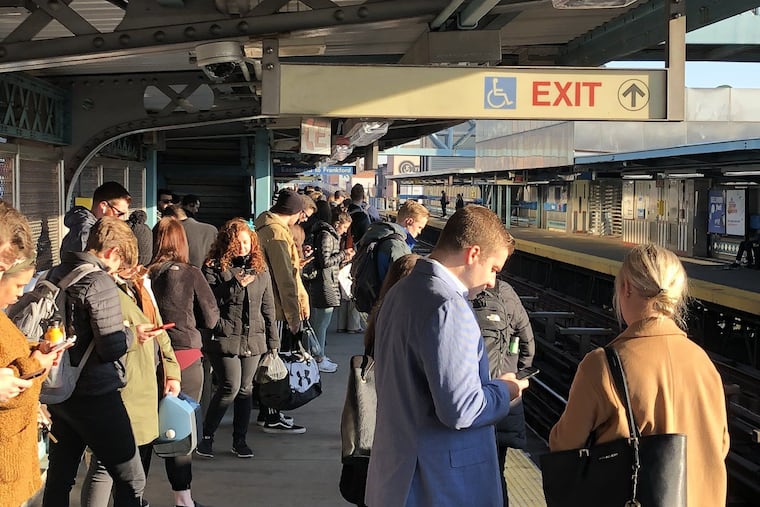Overcrowding, delays on Market-Frankford Line not caused by skip-stop change, SEPTA says
“This morning as we were getting things going, we were playing catch up a little bit,” SEPTA spokesperson Andrew Busch said.

Riders on SEPTA’s busiest line saw delays and overcrowding Monday morning, the first day the elimination of its longstanding skip-stop service went into effect.
Its @SEPTA_SOCIAL Twitter account told Market-Frankford Line commuters that overcrowding was to be expected as it did away with the feature in which "A" and "B" trains skipped over selected stops during weekday rush hour, impacting eight stations concentrated along the east end of the line.
While there may be a period of adjustment for customers, mechanical issues that took two trains sets out of service, as well as a medical emergency, factored into Monday’s problems, SEPTA spokesperson Andrew Busch said.
“We can understand how people kind of made that connection, but it didn’t have anything to do with the new service pattern,” he said.
Overcrowding is expected since today is the first day without A/B skip stop service. ^EN
— SEPTA_SOCIAL (@SEPTA_SOCIAL) February 24, 2020
Around 7 a.m., issues unrelated to ongoing permanent repairs to its M4 cars sent two train sets out of service, leaving SEPTA short as it began the morning rush. Then, a woman’s foot became lodged between a train and platform at the Spring Garden station around 8:20 a.m., Busch said. The woman was not seriously injured, and the incident was cleared a short time later.
“This morning as we were getting things going, we were playing catch-up a little bit,” Busch said.
Larry Giuffra, 30, of Northern Liberties, contended that overcrowding is a reoccurring issue when boarding at the Girard station before 8 a.m., but Monday was “unreal.” Giuffra said he waited about an hour before being able to board a train around 8:40 a.m.
“It was insane,” he said. “So many people were up in arms and just livid this morning.”
Riders expressed frustration on social media, criticizing the elimination of skip-stop service Monday.
Sure but THIS level of overcrowding on the platform itsellf? pic.twitter.com/gReBc2bUWh
— Sam Waterston (@SammyWaterston) February 24, 2020
Michael Noda, a member of 5th Square, an urbanist political action committee, was not aboard the Market-Frankford Line on Monday but knew changes were to take effect and watched from afar. He said the explanation of skip-stop service elimination causing overcrowding made “no sense.”
“When I saw there was a line-disrupting event that would have caused a lot of headaches no matter what the schedule was, I was like, ‘Oh, OK, the data from today has to be thrown out anyway,’ ” Noda said.
SEPTA made the decision to eliminate A/B skip-stop service, in effect from 7 until 9 a.m. and 4 until 5:30 p.m. on weekdays, following two pilots that looked at overcrowding and found no significant issues. Skip-stop service had affected Berks, York-Dauphin, Huntingdon, Somerset, Tioga, Church, Millbourne, and 63rd Street stations.
The feature was intended to better distribute riders, not act like an express train. SEPTA relies on about 138 cars to run peak service, where riders see a train every four minutes.
“Even if I could express a train from 69th Street to 15th Street, at some point it’s going to catch up to the train in front of it because it’s only four minutes away, and then you’re just going to creep along and wait for that train to make all its stops," Scott Sauer, assistant general manager of operations, told The Inquirer ahead of the changes.
SEPTA doesn’t need additional cars or staffing to accommodate the changes. Even though it did not anticipate issues, SEPTA had added hands to observe overcrowding, Sauer said.
In addition to eliminating the skip-stop service, SEPTA is boosting frequency of trains later into the evening. From 6 until 7 p.m., riders should expect a train every six instead of every 10 minutes, and a train every eight minutes from 7 until 8 p.m.
By the time the evening rush got started, SEPTA appeared to have resolved its issues: No burdensome disruptions or delays were reported.